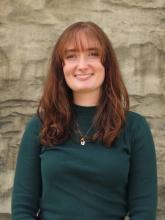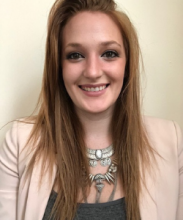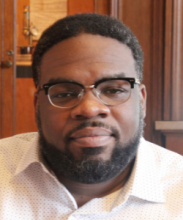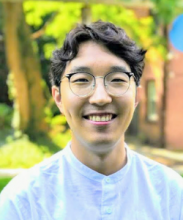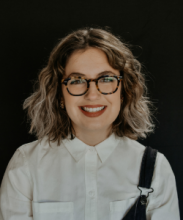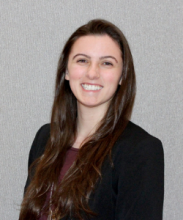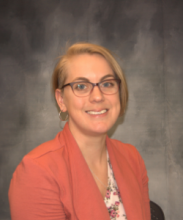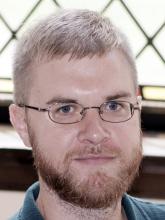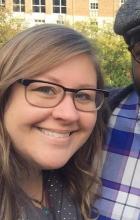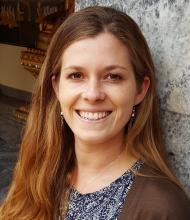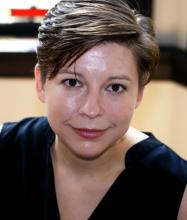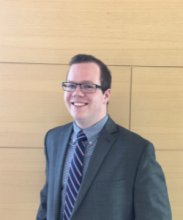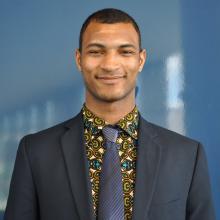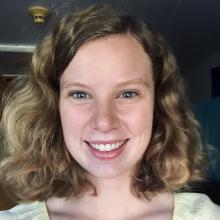To encourage innovation and scholarship, the institute has established a Social Justice Fellowship Program that, through grants, funds faculty and student activities that advance social justice work, from humanistic inquiry to action research.
Previous grants have supported proposals that focus on issues that are both local and global. From youth development to elderly care; from political systems to individual recovery efforts, these projects have represented the same diversity as their recipients.
Graduate Student Fellowships
2024-2025 Fellowships
Examining Risk and Protective Factors that Influence the Relation between Intimate Partner Violence and Housing Instability
Ashley S. Withrow, PhD Candidate at the Mandel School of Applied Social Sciences
Survivors of intimate partner violence (IPV) face an increased risk of housing instability, which can lead to detrimental health consequences. There is a notable lack of literature focused on risk and protective factors which influence the relation between physical, sexual, and emotional intimate partner violence and indicators of housing instability. This mixed-methods dissertation will address the gap by examining how gender, race, age, and other social determinants of health contribute to housing risk for survivors of IPV. Furthermore, due to the profound gap in housing services in the United States, informal support systems are essential to the safety and wellbeing of IPV survivors, yet limited research has explored this area. The qualitative component of this study will blend a phenomenological design with novel application of eco-mapping to explore the experiences of intimate partner violence survivors who rely on family, friends, religious organizations, or other social networks, to achieve housing stability. Implications derived from the proposed studies will be communicated to practitioners in the field in hopes of advancing the equitable distribution of resources and development of interventions focused on the protective nature of social relationships.
Enduring the System: Black Mothers’ Intergenerational Experiences with Child Welfare
Chelsea Flannigan, PhD Candidate in Social Welfare
The proposed qualitative research study will examine intergenerational cycles of involvement with the child welfare system (CWS). Research suggests over 40% of mothers with open child welfare cases have their own history of CWS involvement as children. Complicating this statistic is the growing awareness of how the CWS disproportionately surveilles and polices families of color. Despite this evidence and the known correlations between parental and childhood involvement in the CWS, this population remains understudied in the literature. Using a transformative interpretive framework guided by abolition praxis and Black feminism, this phenomenological study will explore the experiences of Black mothers intergenerationally involved in the CWS through in-depth interviewing and photovoice methodologies. By amplifying the voices of those who have endured lifelong involvement with the CWS, this study seeks to develop a deep understanding of this phenomenon and challenge dominant narratives by identifying systemic factors that facilitate intergenerational involvement.
Understanding Disasters Through an Organizational Lens; A Preliminary Study of Disaster Response
Eleanor Gillerlane Hinkes, PhD Candidate, Medical Anthropology
This pilot study will examine the concepts of vulnerability, resilience, and health in the context of disaster response organizations and communities affected by disasters. Through qualitative interviews with organization workers and community members, this research aims to better understand; 1) how attitudes surrounding disaster response and perceptions of health, wellness, vulnerability, and resilience differ between organizations responding to disasters and communities experiencing disasters, 2) how social, political, and economic structures, with a specific focus on organizational and bureaucratic practices, impact the vulnerability, resilience, and wellbeing of communities, 3) what potential pathways can be identified for organizational and community practices to effectively engage and address gaps in disaster response. This study seeks to contribute to the understanding of how disasters and disaster organizations impact the health and wellbeing of communities, and highlight avenues to be further investigated in future research, including how organizations can utilize community-based approaches to inform disaster response policies and practices.
2023-2024 Fellowships
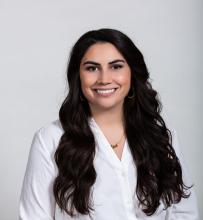 Biculturalism as Buffer: The Association between Bilingualism, Emotion Regulation, and Internalizing Symptomology in Latinx Youth
Biculturalism as Buffer: The Association between Bilingualism, Emotion Regulation, and Internalizing Symptomology in Latinx Youth
Elisa Borrero, PhD Candidate in Clinical Psychology
The proposed research study aims to elucidate the relationship between bilingualism, emotion regulation, and internalizing symptoms in
Latinx youth, clarify specific directions for future longitudinal research, and provide and disseminate culturally-mindful, practical recommendations for mental health providers and Latinx families alike. Latinx families and community organizations will be offered resources that promote cultural pride in the prevention and/or treatment of internalizing problems. Clinicians will be offered didactic materials that support culturally mindful assessment/treatment of and rapport with Latinx teen patients. We expect that Latinx bilingual youth with higher bilingual proficiency in English and Spanish will demonstrate more robust, flexible emotion regulation strategies and, in turn, report less internalizing symptoms. It is further hypothesized that Latinx youth with more bilingually proficient parents will exhibit more emotion regulation strategies and, in turn, report less internalizing symptoms.
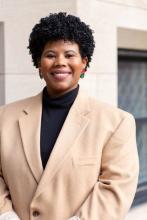
Striving for reintegration: A study examining the experiences of incarcerated mothers
Amber Byrd Ndukwe, PhD Candidate in Sociology
This study will focus on Black incarcerated single mothers ages eighteen and up as they reenter society. Given that African Americans are disproportionately incarcerated in America, it will focus primarily on incarcerated mothers who are Black because they are likely to be represented in this population. There are approximately 2.5 million women and girls released from prison and jails each year. The study will study aspects of reentry, specifically how they repair, forge and build familial relationships, and how they deal with issues like housing and childcare. Furthermore, it will examine frequency of contact, familial networks, support networks, and custody or legality issues. The study will be a qualitative study that entails interviews both before and after they are released. This research is significant because the majority of incarcerated women are mothers, thus their experiences should be represented. More than 60% of women in state prisons, and nearly 80% of those in jail, have minor children. Unlike fathers who are incarcerated, most incarcerated mothers are single mothers, solely responsible for their young children. This research is unique in that it focuses exclusively on the experiences of incarcerated women and the intersection of motherhood and reentry. The research will add to the discussion of the carceral system in America and the public discussions of prison abolition and prison reform efforts.
Health, Wellness, and Hózhó: a CBPR Study with an Indigenous-Serving Charter School
Regan Gee, PhD Candidate in Medical Anthropology
This study will examine the production of health and wellness at a K-8 Indigenous-serving charter school and non-profit in the Southwest United States, using a community-based participatory research (CBPR) framework. CBPR is often recommended by Indigenous communities and scholars as a framework that is protective, equitable, and empowering for Indigenous populations, who have been historically mistreated by academic researchers. The school represents a diverse community of stakeholders who utilize both Indigenous and Western systems of knowledge in their wellness programs. These programs, in turn, act as prisms, allowing us to discover the complex entangling of subjectivity, history, identity, power, and medicine that is then leveraged to promote wellness and health among staff, students, and the surrounding community.
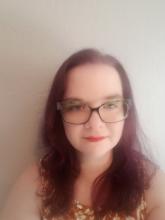
A political economic exploration of the relationship between intimate partner violence histories and Temporary Assistance for Needy Families
Kari O'Donnell, PhD Candidate in Social Welfare
This three-paper dissertation explores the state's role and intimate partner violence (IPV) among recipients of Temporary Assistance of Needy Families (TANF). The overall aim centers on the neoliberal state's role in the lives of economically disadvantaged women through programs like TANF. IPV, a serious and complex social issue, is defined as physical, sexual, and psychological violence and stalking by a current or former partner. IPV is further complicated by financial instability and poverty, which can increase the likelihood of IPV among the general population and lead to increased stress in the household and relationships. Paper 1, an integrated review, assesses the state of theoretical and empirical literature related to IPV and TANF outcomes by gathering a range of studies, including qualitative, quantitative, and mixed methods. Paper 2, a cross-sectional study, will provide a snapshot of the experiences of TANF recipients who have struggled with IPV and examine the role of economic abuse and program aspects that function as barriers to successful TANF outcomes. For paper 3, a phenomenological approach, qualitative interviews will be used to explore the perceptions of TANF recipients experiencing IPV have of IPV, TANF caseworkers, and the role of the state in their daily lives.

The Association Between the Model Minority Myth and Authenticity on Asian American Advocacy and Mental Health
Hailey Chu, PhD student, Clinical Psychology
This project seeks to examine effects that minority stress and cultural values have on social justice engagement. For instance, whether participants think it is acceptable for someone who is Black to engage in social justice versus if they think it is acceptable for someone Asian to engage. Moreover, the project will assess the degree to which someone believes the model minority myth (or has been exposed to it) and the degree to which the person feels justified in engaging in advocacy or social justice for Asians. Additionally, the project will assess cultural values and minority stress as it relates to risk for anxiety and depression in youth.
2022-2023 Fellowships
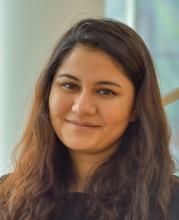
Comparing livelihood capitals and outcomes across migrant and non-migrant networks in Nepal
Alisha Giri, PhD student, Medical Anthropology
The proposed research uses an anthropological approach and draws inspiration from existing scholarship in migration, network studies, and culture to examine the impact of return migration on success and livelihood capitals in the home society. The research will take place in the rural municipality of Myagde, in the Tanahun District of Nepal. This district was one of the top ten origin districts of migrant workers in 2018/2019 (Nepal Labour Migration Report 2020). Many traditionally agricultural families here have shifted their livelihood strategies from subsistence agriculture to remittances in response to the pressures of modernization. The aim of the project is to identify the relationship between livelihood and social networks by collecting information on five livelihood capitals (financial, natural, human, social, physical) that individuals have acquired through their respective networks, and their perceptions of success, through a life-history calendar, semi- structured interviews, and social network analysis in Nepal.
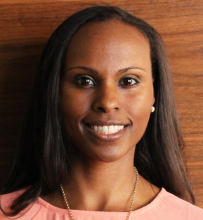
The Cycle of Traumatic Stress: Exploring the Impact of Early Life Trauma in the Workplace and the Role of Supervisor Support
Erica Johnson, PhD student, Organizational Behavior
The study aims are to bring awareness of the psychosocial and environmental harm done to Black employees, families, and communities due to inadequate workplace support, to underscore the prevalence of work and non-work trauma and its lifelong effects within the Black collective, and to further de-stigmatize mental health challenges within this population. Community partnerships can be forged with organizations to provide education to employers on the long-term impact of trauma as well as best practice interventions. Additionally, in partnership with this dissertation study, the YWCA of Greater Cleveland is developing a trauma-informed human resources initiative to address and act on the disproportionate trauma experienced by Black employees. The cultivation of a holistic organizational trauma-informed talent management strategy may not only enhance workplace functioning of current employees but may also help to generate an employment pipeline for Black youth. Through this lens, enhancing supportive workplace relationships with Black employees may increase employment stability, financial security, and family functioning. Thus, study findings can help build interventions to prevent the cycle of trauma prevalent within the Black community.
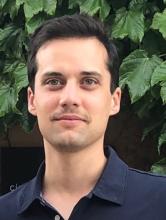
Essays on Community Organization Dynamics
Duncan Mayer, PhD student, Sociology
The goal of this three-paper project is to understand regional and local nonprofit sectors, including key transformations (growth and decline), their relationship to market structure and social forces, as well as the distribution of benefits from nonprofits. While the project will assist policy makers in understanding nonprofit density, supporting regional nonprofit sectors, the project proposes two papers are of immediate relevance to the mission of the social justice institute. The papers described below raise critical questions about the distribution of nonprofits and the communities that receive their benefits.
Paper 1: Nonprofit sector response to neighborhood conditions; a study of organizational founding in Cuyahoga County Ohio.
Paper 2: A study of revealed preference for nonprofit organizations in Cuyahoga County Ohio

Unpacking Legal Consciousness of Citizenship
Reema Sen, PhD student, Sociology
The proposed doctoral study seeks to answer three research questions: (1) What are impacts of legal precarity on Asian Indian immigrants in the US? (2) Is the pathway to citizenship racialized and gendered? (3) How do Asian immigrants understand and navigate the path from temporary to permanent citizenship? This study will examine legal restrictions that impede access to resources such as jobs and social security.
2021-2022 Fellowships
Evicted in Cleveland, Ohio: A Sociology of Displacement and the Role of the Court
Casey Albitz, PhD student, Sociology
Casey Albitz’s doctoral research is focused on formal eviction in Cleveland, Ohio and the relative autonomy of courts within civil forcible entry and detainer actions. Casey will investigate how the Cleveland Municipal Housing Court implements a problem-solving framework and how observed practices reproduce, mitigate, and refute power imbalances between opposing parties.
By focusing on formal eviction in Cleveland, Ohio as a relational process, in which powerful players such as court personnel shape both process and resulting outcomes, Casey’s research will shift the gaze of past researchers on this topic from downstream effects and consequences of eviction, back upstream to the actors and processes refuting, mitigating, and reproducing large scale housing instability.
Investigating Neighborhood Contexts of Racial Inequities in Child Asthma Exacerbations
India Gill, MPH
In Cuyahoga County, African American children have a higher prevalence of asthma (23.0%) compared to White children (15.5%). Social determinants of child asthma disparities, such as racial segregation are well documented, however there is a gap in understanding the cumulative effects.
This study will combine traditional qualitative data collection of interviews with geographical data to gain a deeper understanding of the geographic context of adverse health outcomes and social conditions of those living with asthma in Cleveland. The experiences and insights of those impacted will be used to better inform data gathering to find contextually and culturally relevant solutions to reduce child asthma exacerbation disparities.
Patients, Practice, and the Social Construction of Transgender
Mx. Daniel Basil Hamilton
Daniel's research proposes to use the diagnostic and treatment practice for gender dysphoria, in the Greater Cleveland area to examine the manner in which providers, patients, and healthcare systems construct multiple meanings about the body, sex, and gender and the impact of these multiple ontologies on the provision of care for transgender individuals. The purpose of this project is to explore the ways in which point of care interactions serve as locations for multiple ontologies to come together in the provision of gender affirming care in the United States; how these interactions serve to construct the social and medical narratives of transition; and how care for transgender individuals is influenced by these understandings.
Through exploring transgender experiences in biomedical point of care interactions, this project reveals how those interactions pattern the understanding of being transgender in both individual and community contexts and the iterative impact this has on the provision of gender affirming care across specialties. This project takes an ethnographic lens exploring the ways in which “transgender” is understood between provider and patient across transition related-care and how these understandings influence the sense of what it means to be transgender.
Prevalence and Predictors of Decisional Conflict Among Older African Americans with Advanced Chronic Kidney Disease
Tyrone C. Hamler
Through his dissertation research Tyrone intends to investigate the prevalence and predictors of decisional conflict (DC) among non-dialysis dependent African Americans over the age of 50 who are diagnosed with advanced chronic kidney disease. Decisional conflict is defined as personal uncertainty about which course of action to take when choice among competing options involves risk, regret, or a challenge to personal life values. African Americans are nearly four times more likely to be diagnosed with chronic kidney disease, and older adults are the fastest growing population of individuals living with chronic kidney disease. Decision conflict is a central concern for older African Americans who are managing chronic kidney disease and has been linked to adverse health outcomes and difficulties in making health choices.
There have been limited inquiries into how social workers can assist in advanced chronic kidney disease prior to the start of dialysis. Furthermore, decisional conflict in individuals in the latter stages of CKD has been understudied, and studies have not included a sample of exclusively older African American adults.
Understanding the Construction of Masculinity and Its Effects on Bullying Perpetration from the Perspective of Adolescent Boys Using an Intersectional Framework
Hyunjune Lee
Research shows that the most common reasons cited for bullying by youth include gender, sexual orientation, race/ethnicity, disability, religion, and physical appearance (National Center for Educational Statistics, 2019), suggesting that power imbalance underlying bullying is closely associated with intersections of the social identities of adolescents. Research shows that boys are more likely than girls to bully others (Hellström & Beckman, 2019), which may root from boys’ desire to align themselves with stereotypical ideas of masculinity and may also police other boys who do not demonstrate the ideal masculinity (Mishna et al., 2020). Through this research Hyunjune seeks to understand how masculinity affects boys’ bullying behaviors.
Hyunjune will study the ways in which masculine identities are formed, achieved and/or challenged among adolescent boys; the impact race, SES and violence exposure may have on the construction of boys' masculinity; and the contribution of masculine identities constructed by boys to their bullying behaviors.
Our Stories CWRU: Narrative, Embodiment, & Community Accountability
Gabriela Leskur
Gabrielle Leskur will work with Our Stories CWRU to use personal narrative and performance art as an avenue for communal reckoning and healing on topics of social justice. The program will be a student-led initiative that invites members of the campus community—including students, alumni, faculty, staff, and community members—to share narratives of identity, challenge, resilience, and hope on topics such as race, gender, sexuality, ethnicity, religion, disability, socioeconomic status, immigration status, mental health, and more through anonymous submissions.
The stories will be published in a bound journal and a selection of the submitted stories will be chosen by an advisory group to be brought to life by community members on stage in a public performance in April 2022. The work for Our Stories through the Social Justice Institute Graduate Fellowship is intended to be a pilot program that creates a model student leaders can employ in coming years to form an annual Our Stories event to fit the ever-changing needs and ever-evolving stories of the CWRU community.
Health Communication to Improve Health Outcomes: A Comprehensive Training for Pre-Health Students Centered on Targeting Social Disparity and Improving Health Literacy
Rebecca Manning
Recent research reveals that more than half of the population has a low level of health literacy. This means most people misinterpret health information, misunderstand prescription labels, face communication barriers, and are less adherent to medical plan regimes. Current health outcomes reflect an abundance of preventable disease states and an increasing number of patients who are not confident in their own care process. Moreover, when trying to grasp the nature of health literacy, it is important to understand that certain groups are more susceptible to poor health outcomes than others. The CDC reports that these groups experience more frequent emergency room visits, longer hospital stays, and higher mortality rates.
Through the creation of this advocacy training, Rebecca hopes to improve patient outcomes by ensuring the translation of complex medical plans into layperson language. She intends to do this by educating pre-health students on the connection between disparity and health outcomes of vulnerable populations. The training will be scenario-based and community-focused, pulling from research on the community participatory model and shared appointments. This project aims to bridge the gap between our healthcare system, interdisciplinary research, and vulnerable communities through an in-depth examination of our current communication strategies.
Healthcare Navigation & COVID-19 in Cleveland’s Bhutanese-Nepali Refugee Community
Jillian Schulte
Neighborhood Family Practice (NFP) is a Federally Qualified Health Center (FQHC) dedicated to providing quality primary healthcare services to a diverse population of Cleveland residents. Throughout 2020-2021, Neighborhood Family Practice (NFP), a Federally Qualified Health Center (FQHC) dedicated to providing quality primary healthcare services to a diverse population of Cleveland residents, has observed that the Bhutanese-Nepali refugee population has been, “hit particularly hard by the pandemic” This impact is echoed by local advocacy groups, such as The Bhutanese Community of Greater Cleveland. For her MPH practicum, Jillian aims to partner with NFP to reach a greater understanding of how the Bhutanese-Nepali community is experiencing the pandemic and navigating the healthcare system.
Jillian will conduct In-depth, semi-structured interviews with medical staff, managers and patient advocates for the Nepali community, and Bhutanese-Nepali patients to assess their experience navigating the U.S. healthcare system, their perception of community health needs, and the role COVID-19 has played in their daily lives.
Visions of Democracy in American History
Kimberly Stahler
Kimberly Stahler's dissertation research examines social justice activism in Cleveland from 1960 to 1975, and argues that grassroots organizers and activists overcame differences in race, gender, and class in order to forge relationships with imperfect allies out of dedication to their causes.The fellowship funds will cover a research trip to Madison, Wisconsin, and the creation of a story-telling podcast series entitled “Visions of Democracy.”
Kimberly's work seeks to challenge the argument that identity politics prevent activists from forging alliances and encourages activists to reconsider relationships in social movements and by exposing them to creative ways that Americans have historically participated in democracy.
2019-2020 Fellowships
Being and Belonging: Transnational Lives of Second Generation Arab Americans
Luma AlMasarweh, Graduate Student, Sociology
Mobility, Agency, and Inequality in Late-Life: Approaching Puerto Rican Elderhood from an Intersectional Life Course Perspective
Brooke Jespersen, Graduate Student, Anthropology
Exploring the Role of PrEP Implementation Strategies in Reducing Disparities to HIV Prevention Services
Julie Schexnayder, Graduate Student, Frances Payne Bolton School of Nursing
Crowded Work: A Participant-Observation Study of Platform Labor
Michael R. Slone, Graduate Student, Sociology
2018-2019 Fellowships
Reducing Lung Cancer Disparities at a Community Scale using a Multilevel, Data-driven Approach
Uriel Kim, Graduate Student, Clinical Translational Science
Ancestral Medicine and Cultural Persistence: Community Resistance to Colonialism and Cultural Commodification on Rapa Nui
Sonya Petrakovitz, Graduate Student, Medical Anthropology
2017-2018 Fellowships
An Investigation of the Detroit Shoreway Developing Neighborhood
Lacey Caporale, Graduate Student, Sociology
2016-2017 Fellowships
The Effects of TRAP Laws on the Timing of Abortion
Elizabeth Nalepa, Graduate Student, Sociology
Masculinity, Gender Norms and HIV Risk in Low-Income Communities in Kampala, Uganda: An ethnographic pilot study
Megan Schmidt-Sane, Graduate Student, Medical Anthropology
2015-2016 Fellowships
Transnational Health Care in Urban Brazil
Frank Manzella, Graduate Student, Anthropology
2014-2015 Fellowships
Belonging and Experience: An Ethnographic Study of Addiction Treatment in the Post-Welfare United States
Allison Schlosser, Graduate Student, Anthropology
Family Care Arrangement and Elder Mistreatment for Dementia Patients in China
Yan Zhang, Graduate Student, Medical Anthropology
Undergraduate Student Grants
2019-2020 Fellowships
Israeli Practices towards the Palestinian People and the Question of Apartheid with Dr. Richard Falk
Tim O'Shea, Junior, Political Science
2018-2019 Fellowships
Fish and Gender Displacement: Actor-Networks of Community Fisheries Management in Senegal
Leo Ndiaye, Junior, Environmental and International Studies
Examining HIV Prevalence and Risk Behavior within Johannesburg Townships Affected Differently by Apartheid
Jennifer Nielsen, Junior, Medical Anthropology and Public Health
2017-2018 Recipients
"I Do Wanna Dance": The Lived Experiences of Professional Dancers of Color
Mary Therese Escueta, Senior, Sociology and Dance
A Dynamic Analysis and History of Street Medics in the United States
Anjana Renganathan, Senior, Biology
2014-2015 Recipient
Hip-Hop Education and Learning (HEAL)
Suneil Kamath, Sophomore, Business Management




